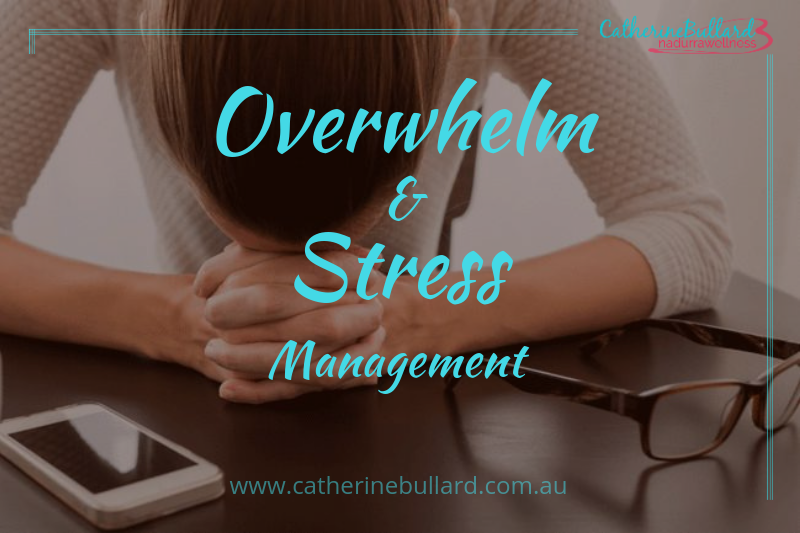Living in our world is stressful. But there are ways you can make things easier when overwhelm and stress rise up. These natural stress management techniques will help you manage overwhelm so you don’t crash and burn.
Unfortunately for us, our lifestyle has changed but our bodies haven’t. They still operate as if they’re in the stone age. The only way to juggle modern life with our stone-age body is by setting up some hard-and-fast Self-Care practices to keep on top of overwhelm.
In a stressed fast-paced life our bodies constantly pump out the stress-hormone cortisol. When our lifestyle consists of long work hours, sleep deprivation, poor diet, smoking, high caffeine intake, and little relaxation we overload our adrenal glands until they give up. Untimately stress breaks us and we fall apart.
We take our busy stressed life for granted and so often don’t even realise when we’re close to the overwhelm tipping point. Until suddenly that final stress happens and we go under with illness, emotional collapse or ‘life-disasters’. And usually we hadn’t even noticed it coming.

How To Manage Overwhelm For Working Women
Naturally you need to get organised, to schedule and plan to get on top of overwhelm. Setting realistic goals, prioritising and postponing non-essentials are a vital key to surviving in a busy world and workplace. But unless you also make lifestyle changes these are just like shuffling papers. They help you stay on top of things but in the long run they don’t really change much.
Sleep
Sufficient quality sleep is the Number One tool to manage overwhelm.
Because we’re so busy and there’s a;ways pressure to do more it’s way too easy to dismiss this. But the reality is, when you regularly get 7 to 8 hours sleep you work faster and more efficiently the next day. And you can’t play catch-up on the weekend after a whole week of late nights. The body doesn’t work like that. Good sleep needs to be regular.
When You Can’t Fall Asleep
- Stop using your phone, computer or TV one hour before bedtime
- Exercise regularly. 30 minutes during the day helps you fall asleep
- Don’t eat snacks high in sugar, dairy or processed grains before bedtime
- Avoid or cut back caffeine in coffee, cola, some processed food, drinks and medications. Don’t drink coffee after lunch
- Leave electronic devices in another room, or at least 2 metres from the bed. It’s not enough to put them on aeroplane mode as it doesn’t reduce their disrupting effect on sleep.
- Get to bed before midnight. Your body detoxes the most in the hours before midnight. So early sleep is valuable for your health and wellness.
When You Wake Up And Can’t Get Back To Sleep
- Avoid alcohol. It might send you off to sleep but alcohol has a kick-back effect that leaves you wide awake a few hours later. And it prevents you entering deeper, restful sleep.
- Get up, and go out into another room to read or journal. It’s important your brain associates your bedroom with sleeping, not with lying awake. Don’t look at your phone or TV, it will keep you awake even longer.
- Gentle yoga, tai chi, qi gong, meditation in the evening all aid relaxation. Even 10 to 15 minutes helps.
- Don’t take work to bed. Stop working an hour before bedtime and leave it for the morning. Beds are for sleeping and it’s really important to train your brain with that thought.
- Your body clock quickly aligns when you set and stick to the same daily sleep and wake-up times.
- Don’t watch the clock! Turn it away. Watching the hours tick over only increases your stress and anxiety.
Natural Ways To Help Sleep
- Chamomile tea in the evening can relieve anxiety and help you relax. Lemon balm, passionflower or valerian root tea may also help. Or find any night time sleep blend you enjoy.
- When thoughts whizz round your brain keeping you awake, get up and write them down to clear your head. Dump your worries and plans to calm down your nervous system. They’ll be there in the morning when you can deal with them more effectively.
- If you know what disturbs your sleep prepare yourself. Wear warm socks for poor circulation. If the possum outside the window or a car backfiring wakes you, wear earplugs. Get a sleep mask if the slightest light disturbs you.
- If you need light during the night use a Himalayan Salt Lamp instead of a normal night light because it doesn’t interfere with melatonin and your circadian rhythms.
- Create a Conscious Self-Care bedtime relaxation routine and include whatever makes you feel grounded, relaxed and whole. This might be meditation, a warm bath, massage, reading, aromatherapy, calming music, or journaling. Anything that makes you feel good so you look forward to doing it every night. Set this routine and your body will begin to associate it with going to sleep.
If nothing seems to help get a health check-up. Certain diseases such as diabetes, fibromyalgia or cardiovascular disease.can interfere with sleep. Menopause symptoms can leave you feeling desperate when they disrupt your sleep. If heat flushes, pain or palpitations interfere with your sleep a homeopath or natural therapist can help bring your body back into balance and reduce symptoms.
I find a combination of homeopathic remedies and herbal essences the most effective natural remedies for my natural health clients. When we combine these with simple lifestyle changes their sleep problems quickly improve.
Mindfulness
There are plenty of mindfulness courses around. But basically, mindfulness is something you can learn yourself. And the more you practice it the more naturally it becomes a regular part of your life.
Mindfulness is about being fully present in the moment and with what you are doing. It’s about developing awareness so you don’t overreact or become overwhelmed by what goes on around you. When you bring awareness to your emotional or mental state through your senses you create a pause to regroup, instead of becoming sucked into the drama. And research shows mindfulness practice re-models the structure of your brain to help you respond better to stress.
Simple Ways To Practice Mindfulness
Mindfulness isn’t meditation. You’re not trying to stop the mind.
- Set aside some time. Engage with your breath. Learn to breathe mindfully here.
- Sit quietly and simply pay attention. Observe with each of your senses what’s going on around you and within you.
- Notice what you notice – sounds, smells, what your body feels like, what thoughts appear.
- Don’t engage with any of it, your only purpose is to observe. If judgements arise notice them but let them pass.
- Don’t follow thoughts that come up. Notice them with interest, and let them go.
- Just be aware, and whatever comes up always return to the present moment.
- Be kind to yourself. Don’t judge. When your thoughts wander gently bring your focus back to the present moment.
Anchor your mindfulness practice by engaging it throughout the day. Regularly stop and tune into what you notice when you engage awareness. Notice the movement of a tree outside the window; the sound of a dog barking in the distance; the flavour and crunch of your apple; even the colour of your pen. Just these brief moments of mindful awareness will strengthen your ability to disengage with stress and manage overwhelm.
Remove Yourself From The Stress
Often when overwhelmed what we really need is to get out of the situation by changing our surroundings and moving our body. When we stay and press on we simply get sucked deeper and deeper into the overwhelmed state.
Take yourself outside into the fresh air, even better if you’re surrounded by nature, in a park, or by a river. Breathe deeply into your belly to ground and calm you. And then walk. As you walk notice your surroundings without engaging with them – the sun, rain or breeze on your skin, other people, birds. Don’t worry over the problem. Instead disengage and practice mindfulness as you walk. Simply observe what’s happening around you with awareness and detach yourself emotionally.
Take a few moments to roll your shoulders and neck, and relax other muscles where you may be holding stress.
You don’t need to walk for long, even ten to fifteen minutes will bring you back to earth.
It might seem counter-intuitive to go for a walk around the block when you’re snowed under. But walking can quickly reduce your stress levels. It improves blood flow to the brain and encourages the release of endorphins, hormones that are linked to happiness. Walking outside can promote calm by providing a sense you’re escaping into a peaceful environment.
Research shows that although you may waste some time with this practice, when you return you’ll be clear-headed and far more efficient. Consider how much time you waste when you become trapped in overwhelm and the time spent walking becomes a great investment.
If you can’t get outside, move away from your desk and walk around the office or into another room. Don’t engage with others, you are trying to briefly separate yourself from your environment.

Disclaimer
Information and opinions presented here are for information purposes only and not intended as a substitute for professional advice offered during a consultation with your health care provider. Do not use this article to diagnose a health condition. Speak to your doctor if you think your condition may be serious or before discontinuing any prescribed medication. Please consult with your health care provider before following any of the treatment suggested on this site, particularly if you have an ongoing health issue.
